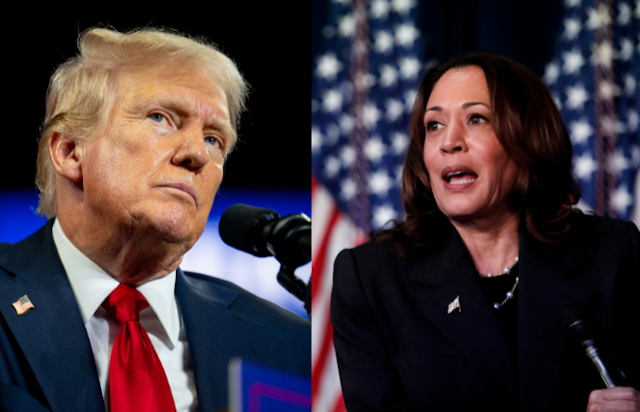Robert Shand, Assistant Professor of Education, American University
When it comes to education policy, former President Donald Trump and Vice President Kamala Harris not only have mostly distinct visions but also distinct track records.
Harris is calling for a wider role for the federal government and larger investment to improve educational opportunities. Trump is focused on reducing the federal role in education and relying upon states, localities and parents to make educational decisions and investments.
At the same time, there are some commonalities, including the growing importance of career and technical education. What follows is a review of what the two candidates have done in the world of education while in office.
On higher education
The candidates share a concern about the high cost of higher education. But they have different visions for how to address those costs. As California’s attorney general, Harris secured a US$1.1 billion judgment against Corinthian Colleges for false advertising. The judgment provides refunds for students who were misled by claims about job placement rates, program offerings and military affiliations.
Whereas Harris has pursued for-profit colleges for fraud, Trump has focused on promoting innovation by reducing regulation and expanding alternatives to traditional higher education. This includes making it easier for online, faith-based and for-profit institutions to be accredited.
As part of the Biden administration, Harris has pursued student loan debt forgiveness. She has also strongly signaled her support for expanding access to the Public Service Loan Forgiveness program. This follows her having co-sponsored legislation for debt-free college as a United States senator.
The administration has faced challenges to the constitutionality of the loan forgiveness initiative on the grounds that the president does not have the authority under present law to unilaterally cancel debt. Opponents have also said any debt forgiveness would have to be authorized by Congress. Critics say further that loan forgiveness does not address the root causes of rising costs of higher education. Loan forgiveness could cause further price increases if institutions thought that students would care less about the cost of college in anticipation of having their debt forgiven.
Trump created two entities to advise the federal government on workforce development and training needs: a council of federal officials and an advisory board of business leaders.
In 2019, Trump signed a bipartisan bill to make permanent $250 million in annual federal funding for Historically Black Colleges and Universities, or HBCUs, that was previously subject to annual renewal.
Harris has called for reducing degree requirements for federal jobs. She also promoted job training programs as an alternative to incarceration in her Back on Track initiative as attorney general of California from 2011 to 2017.
As attorney general and then a U.S. senator from California, she called for greater oversight of advertising by for-profit colleges and debt forgiveness for former students of for-profit colleges. She also supported expanding federal aid to public and nonprofit colleges, including free community colleges and large grants to HBCUs.
On K-12 education
The 2024 Trump campaign platform calls for sweeping changes to K-12 education policy. This includes universal school choice and more parental control over schools, which would entail allowing parents across the country to use educational funds to pay for private school through vouchers or tax credits if they chose. It also features a drastically reduced federal role in education. In fact, Trump wants to eliminate the U.S. Department of Education. Many of these plans, such as direct election of school principals by parents, are unlikely to come to fruition due to the fact that schools in the United States are mainly under state and local control.
Under the Tax Cuts and Jobs Act of 2017, Trump expanded college savings 529 plans to allow parents to save up to $10,000 per year tax-free for K-12 private school tuition.
While president, Trump made several other proposals that could foreshadow his future plans. These proposals include creating a $5 billion federal tax credit for private school tuition, cutting the budget for the U.S. Department of Education in annual budget requests and turning the Title I allocation for supplemental services for students in poverty, such as smaller classes or tutoring, into a block grant to states.
The Biden administration has sought to expand federal funding for full-service community schools. Full-service community schools are public schools that receive additional funding and staffing to help address the academic needs of students as well as factors outside of school, such as access to health care and healthy food, that affect learning.
The Biden administration also expanded Title IX gender discrimination protections to include sexual orientation and gender identity.
As a candidate for the presidential nomination in 2019, Vice President Harris also called for federal funding to provide teachers with an average of a $13,500 raise, though she has not made a similar call in this campaign.
As California attorney general, Harris made reducing chronic absenteeism a signature issue when she led the In School and On Track anti-truancy initiative. This initiative included additional funding to districts and schools to use data to better understand and monitor absenteeism and to communicate with parents about the importance of school attendance.
The data and communication-focused approach was an evolution from her initial approach as San Francisco district attorney, which placed more emphasis on prosecuting parents for truancy.
On early childhood learning
Neither Trump nor Harris has a significant record of tangible actions when it comes to early childhood education. Project 2025, which Trump has disavowed but was written by close allies of the former president, calls for eliminating Head Start, a federally funded, locally run, early childhood learning program to support low-income families.
Although Trump made several similar proposals to cut funding for the Child Care and Development Block Grant by about 5%, they were not passed into law by Congress.
Harris has made calls for free, universal prekindergarten for all 4-year-olds, but the Biden administration was not able to get its early childhood proposals through Congress.
More recent studies of some universal pre-K programs have raised questions about how long the academic gains from early childhood programs persist. On net, however, the evidence from the highest-quality studies for high-quality early childhood programs in general, and the Head Start program in particular, suggests that they improve cognitive skills among children.


















